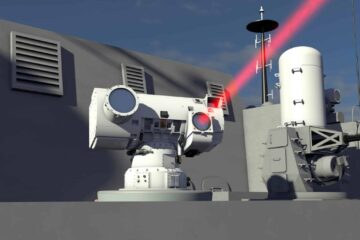On 11 July, in a written Ministry of Defence (MoD) response to a parliamentary question, Minister for Defence Procurement (Min DP) Jeremy Quin announced “It has been decided that extending in service and upgrading RFA Argus, and operating her alongside our Landing Ship Dock (Auxiliary) [LSD(A) vessels] in their current configuration, represents the optimum solution to support a forward-deployed LRG.”
“This will provide a sustainable air manoeuvre, surface manoeuvre, and command-and-control [C2] capability, with the ability to manage availability as platforms undergo maintenance,”
Minister for Defence Procurement (Min DP) Jeremy Quin
The decision followed a UK Royal Navy (RN) analysis of design and cost options for upgrading amphibious shipping to support UK commando forces, he continued.
However, the minister confirmed that the Argus and Bay-class LSD(A) combination will provide an interim capability only. “The lessons from this analysis, and from operating these platforms forward in the coming years, will inform the procurement of the Multi-Role Support Ship (MRSS), which will replace the capabilities embodied in these platforms in the future.”
On 5 July, the MoD hinted at the decision to downselect Argus. In oral evidence to a House of Commons Defence Committee (HCDC) hearing on the UK’s national shipbuilding strategy, UK Secretary of State for Defence Ben Wallace said “Two years ago, [the RN] was of the view that it would convert a Bay class to give it a better capability to store helicopters. That has currently changed and I am expecting a proposal, although it has not been signed off, that Argus may fulfil that function.”
The navy’s decision may have been informed by wider developments in the ship’s capability. Vice Admiral Sir Chris Gardner, Director General Ships at the MoD’s Defence Equipment and Support procurement agency, told the HCDC hearing that “we have just extended her in-service life in order to maintain our access to a Role 3 medical capability for the foreseeable future.”
The UK’s LRG requirement was set out in the MoD’s Defence Command Paper (DCP), published in March 2021 alongside the wider ‘Integrated Review’ of UK defence, foreign, and security policy.
The DCP noted that the UK Royal Marines’ Future Commando Force (FCF) concept is designed to provide a high-readiness, rapid reaction, forward-deployed littoral strike force, operating from two LRGs – one each in the Euro-Atlantic and Indo-Pacific theatres. The DCP defined an LRG as “A bespoke force, assigned to a geographical area, that contains dedicated shipping, helicopters, and boats.”
The DCP also detailed the interim and long-term capability options, stating that the UK would be investing “more than £50m in converting a Bay-class support ship to deliver a more agile and lethal littoral strike capability”, alongside longer-term development of MRSS “to provide the platforms to deliver littoral strike, including maritime special operations, in the early 2030s”.
The shipping required to support LRGs must be able to host, support, sustain, and operate a range of surface craft and aviation assets; deliver ashore FCF force elements and their equipment, including vehicles; and provide C2 for the deployed force (including ships and units ashore) and for multi-domain, multi-national, and multi-agency integration.
The outcome of the RN’s analysis of interim and longer-term options includes a combination of available, converted, and bespoke platforms.

Naval News understands that – while interim platform options include Argus, the Bay-class LSD(A)s, and the Albion-class landing platform dock (LPD) vessels – there are currently no plans to undertake conversion work on the LSD(A)s or LPDs to meet the interim LRG deployment requirements.
In 2023, an LRG will be deployed to the Indo-Pacific for the first time. Planning for this mission is already underway, and platforms will be drawn from those available and suitable. MRSS remains the long-term option, as it will be designed to provide the full capabilities necessary to support littoral strike requirements in the 2030s. Navy News understands that MRSS is currently in its pre-concept phase, with the intent being for the programme to move within 12 months into the main concept phase to analyse requirements for delivering the range of capabilities needed






